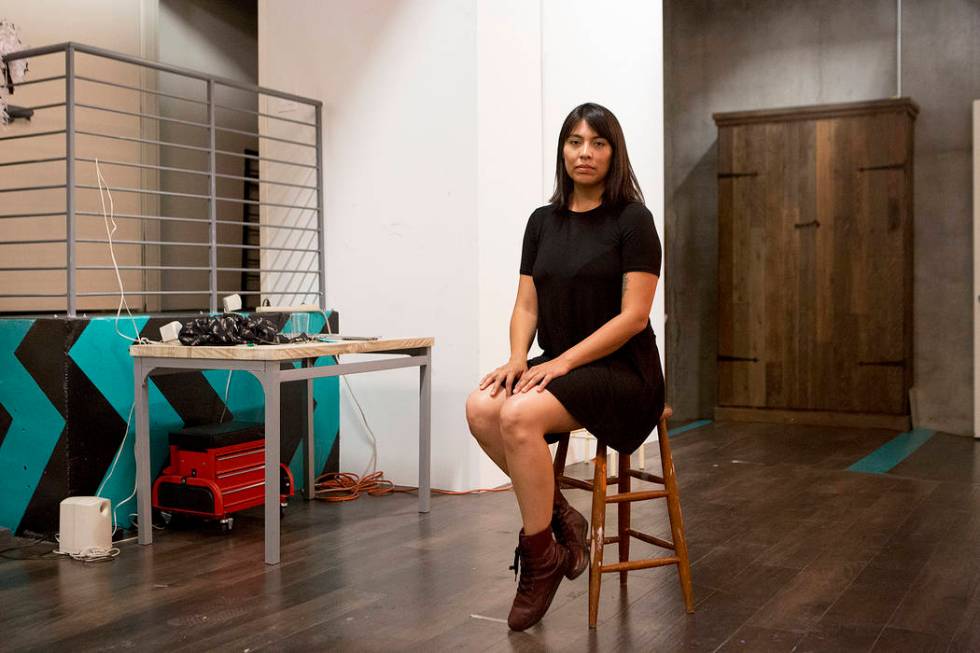Las Vegas artist-in-residence Ramirez given space to grow

Handwriting has played a large role in Krystal Ramirez’s life.
In elementary school, her dad used to take the words she got wrong on spelling tests and have her write them over and over until she memorized them. Now she’ll never forget how to spell “because” and “environment.”
During childhood summer vacations to Mexico, she would help her cousin fill up handwriting practice booklets, drawing the letters of the alphabet over and over, the same way each time.
At her 2013 “I’m Sorry We Lied” exhibit at the Winchester Cultural Center, sheaves of typewriter paper lined a wall. Each sheet bore a different handwritten sentence or phrase, repeated. Phrases included “I’m doing the best I can,” “Such a cold and lonesome heroine,” “But I never lie when we’re lying down” and “we are dreaming. hurry!”
Ramirez calls herself an overthinker.
“I’m always like, ‘Should I do this? Should I write this or think this?’” Ramirez said, leaning over a plain wood table in her future studio space. “So I just have a habit of writing little things down like OK, I’ll come back to this later.”
Ramirez, 32, is the second artist in residence at Juhl, a downtown condominium complex on East Bonneville Avenue. Her term began Oct. 1, and she’ll spend six months living and working in a ground-floor studio and apartment space at the complex.
Ramirez graduated from UNLV in 2009 with a Bachelor of Fine Arts in Art and a minor in Spanish literature. After a few years of bartending around town, Ramirez worked as a commercial photographer and landed a photo job at weekly magazine Vegas Seven.
For 2½ years, she has photographed events such as downtown Las Vegas’s Life is Beautiful festival and RuPaul’s DragCon. She’s taken portraits of casino executives and celebrity chefs; she’s featured marijuana growers and tequila distilleries.
While describing her mediums, Ramirez struggled to include photography as part of her artistic side, because it’s what she does for a living. But photography was a large part of what she studied in art classes in college. It was a photography class that inspired her to major in fine arts instead of business, the major she entered school with.
“I, for some reason, never thought I could do both (photography and art) together,” Ramirez said. “So then I started doing commercial photography and … I was like, ‘Well now I can definitely not mix these two.’”
Ramirez’s website features sculptural work from her recent installations at the Clark County Government Center, Gamma Gamma Gallery and Nevada Museum of Art. But it doesn’t contain any of her commercial photography work.
Once she begins her residency, Ramirez said she wants to print her photos, something she has not done since college.
“You have a completely different experience with a photograph when it’s an object,” Ramirez said. “Also, once you make it into an object, it might not work.”
The residency
Ramirez was one of over 30 artists who submitted applications for Juhl’s residency. She was selected by a board consisting of Juhl’s previous artist in residence, Justin Favela; Juhl part-owner Uri Vaknin; art consultant and curator Michele Quinn; and Katie O’Neill, chairman of the board for the Art Museum at Symphony Park.
Artists were asked to explain why they want the space, what the space would do for them and their career and how they would contribute to the downtown arts scene.
“For me, (the residency is) more about also showing Las Vegas what having contemporary artwork is all about,” Vaknin said. “It’s this grass-roots effort to really promote this artistic and cultural vibrancy in downtown Las Vegas.”
Work created during Favela’s residency is on display at the Denver Art Museum in an exhibit called “Mi Tierra: Contemporary Artists Explore Space,” which features site-specific installations by thirteen Latino artists from across the American West.
“What we all felt with Krystal was that this residency would literally take her work to the next level,” Vaknin said, “and it would take her career to the next level. It would give her an opportunity to really focus on her work.”
Favela said the biggest piece of advice he would pass on to Ramirez is to take advantage of the large space. Another piece of guidance: “Measure the door,” Favela said. “I made work that was too big … I had to cut it into pieces because it didn’t fit out the door.”
Ramirez said her first big project is to recreate her 12-by-15-foot piece “I Want to See,” displayed at the Clark County Government Center until recently. The giant banner (which also featured handwriting), made with Bible paper and sewn together with thread, became irreparably damaged during its stay there. The Marjorie Barrick Museum of Art asked if Ramirez would donate the piece to its permanent collection once she’s finished.
“You always … or I always think back when I make work like, ‘Oh I should have done this just slightly different,’ or, ‘I love this, but it would have looked better this way,’” Ramirez said. She’s excited to try again.
Ramirez also is dreaming up a large crochet piece. She wants to take advantage of as much of the studio space as possible.
“I want to try to get away from text,” Ramirez said. “Not necessarily get away from letters or symbols … but definitely from this look,” she said, referring to a picture of some of her previous work.
“I just want to use this space as, like, an experimental space to make work that may or may not be good,” Ramirez said, without worrying if people like it. “Just stuff that looks different.”
Contact Madelyn Reese at mreese@viewnews.com or 702-383-0497. Follow @MadelynGReese on Twitter.